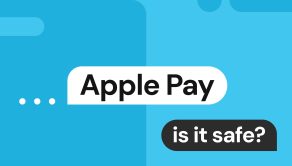Spot and avoid: top 10 Snapchat scams to watch out for
 Erin Kapczynski
SVP, B2B Marketing at Onerep
Erin Kapczynski
SVP, B2B Marketing at Onerep

Have you been scammed on Snapchat?
In the first four months of 2023, ten different University of Missouri students reported being extorted by Snapchat scammers. Scammers pretended to be romantically interested in their victims, building trust over time before asking to exchange explicit photos with one another.
Once victims complied, the scammer immediately turned around and threatened to post the photos online for everyone to see. Paying a ransom was the only way to prevent this from happening.
This kind of “sextortion” scam can be executed on any platform, but it’s especially common on Snapchat. As of June 2023, the social media platform has more than 750 million daily active users worldwide – many of whom are teenagers and young adults.
Sextortion scams are just one of the many risks that come with such a large group of young users. Hackers are using Snapchat to lure victims into a wide range of fraudulent schemes.
This guide will show you what kinds of scams to look out for and tell you how to secure your Snapchat profile against them. It’s also ideal for parents who want to keep their children safe while using the app.
What do scammers want your Snapchat for?
Most scammers are financially motivated. When they try to trick you into sending explicit photos, giving up your login credentials, or clicking on malicious links, their ultimate goal is to earn profit.
Directly extorting people for money is one of the simplest ways to do this – but it’s not the only way. Scammers may want to use your account to scam others by impersonating you and abusing the trust you share with your friends and contacts. They may commit identity theft and use your hacked account to send money to themselves.
If a scammer gains access to your account, they may be able to access your account login information, your photos and videos, or even break into your bank accounts. Having a strong password may not be enough to prevent Snapchat scams from affecting you.
These risks are even more concerning for young Snapchat users. The platform allows anyone over 13 to create an account. Young users are especially vulnerable to Snapchat scams, fraud, and identity theft, and must learn to recognize the appropriate warning signs.
How to tell if a Snapchat account is fake
Anyone with an email address and a mobile device can create a new account, making it easy for scammers to create fake profiles. Learning how to spot fake Snapchat accounts will help you avoid Snapchat scams.
Many fake accounts feature attractive, wealthy people flaunting luxury goods and cash. They may claim to have prestigious social standing or to be associated with well-known brands. Some scammers simply impersonate reputable influencers and celebrities, hoping their victims will be starstruck into complying with whatever demands they make.
Here are a few warning signs to look out for when examining someone’s Snapchat account:
- An unusually low Snap score. It’s perfectly fine for a normal user to have a low Snap score, but it’s highly unlikely for a professional influencer or celebrity. If someone claims to be an influencer but doesn’t have a high Snap score, it’s probably a fake account.
- Snap map data doesn’t correspond. Snapchat lets users post geolocated data in their snaps. Someone may post snaps from places far away from their profile location while traveling, but if they do it constantly it may be a scam.
- Profile imagery looks too professional. Snapchat encourages users to post small bits of content from their everyday lives. While some professionals and celebrities exclusively post highly polished imagery, most people don’t. If you’re unsure whether a user’s Snapchat account photos are genuine, try running a reverse search on Google for them.
- No Bitmoji. The cartoon avatar that appears next to every Snapchat user’s name is an important part of that user’s identity. Since most Snapchat users take time to customize their Bitmoji, you should treat accounts that don’t have them with more caution.
- Unsolicited messages asking for help. If a random account adds you and sends a message asking for help, it may be a fake one. This also applies to unsolicited messages containing links, QR codes, and other interactive elements.
10 most popular Snapchat scams and how they work
1. Snapchat sugar daddy/sugar momma scams
Sugar daddies and sugar mommas are older, wealthier people who seek romantic companionship from young, attractive people. Sugar relationships are based on exchanging financial support for affection and attention.
These relationships do exist in real life, but they are rarely the product of unsolicited social media messages. Many platforms exist for connecting people with one another for sugar-type relationships, and they typically verify new users in an attempt to cut down on scams.
None of this happens on Snapchat, because the platform is not designed for cultivating sugar relationships. This makes it easy for scammers to create fake profiles, build trust with victims, and then disappear after stealing data or money.
What does this scam look like?
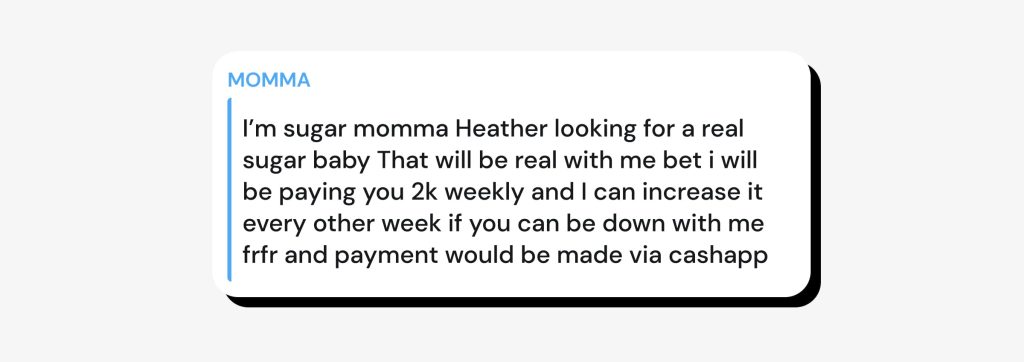
A typical sugar scam starts with an older person messaging a younger one, promising to help pay off bills or purchase expensive gifts in exchange for companionship. If the victim cooperates, the scammer will use a stolen credit card to send a large sum of money to the victim’s account.
At this point, the scammer will invent a reason to get some of the money back. They will often ask for a small percentage back in the form of gift cards. When the bank finds out that a stolen credit card was used for the original transaction, it will take the money back – minus the amount already sent back to the scammer.
How to spot a sugar scam on Snapchat
Be very suspicious of strangers who reach out promising financial support for any reason, especially on Snapchat. Never agree to any sort of payment scheme that relies on you giving money to someone in order to receive money from them.
Don’t trust incoming funds even if they appear to be legitimate. If you receive a large amount of money from someone you don’t trust, wait for thirty days before withdrawing it. If the funds were stolen, the bank will refund the payment automatically.
If you are interested in pursuing a sugar relationship, use a dedicated platform designed for matching people with one another after they’ve been verified by a trusted third party. Don’t trust unsolicited offers from anyone you met through the Snapchat app or any other public social media platform.
2. Account impersonation scams
Hackers may break into the accounts of people you know and trust in order to carry out Snapchat scams. These scams almost always end with you giving money to someone you think is in trouble.
This kind of scam uses social engineering to deceive you into thinking you’re helping someone in need. To carry it out, hackers must first compromise the account of someone you know. Then, they will spend some time looking through that person’s information and try to identify potential targets.
Scammers may reach out to close friends and family members, but these Snapchat scams work best when the user’s Snapchat account isn’t a close contact. Impersonating someone is not easy, and it’s even harder when the victim knows their friend well. They can tell when someone is using a friend’s hacked account to run Snapchat money scams.
For example, a hacker may invent a sad story about a hospitalized relative who needs money for an expensive surgery. If it’s a close friend’s account, you may call them to ask if they’re okay. If it’s not a close friend’s account, you’re more likely to send money without checking if the account belongs to the user in question.
Why spotting account impersonation scams isn’t easy
Account impersonation scams used to be easy to catch. Many scammers lack the language and communication skills to impersonate people convincingly. If an acquaintance writes to you with a completely different voice and vocabulary than what you’re used to, there’s a good chance it isn’t really them.
However, new AI-powered chatbots have completely changed the way these Snapchat scams work. Now, scammers can simply feed their victim’s texts into a large language model and train it to output conversational language in that style. They can do this in any language, with no technical skills whatsoever.
What to do if you think someone is impersonating a contact of yours
If someone you know reaches out to you asking for help or requesting money, take time to verify them first. Try reaching out to your contact using a platform other than Snapchat, and don’t give in to the pressure to act now – no matter how urgent the situation may seem.
You can also try calling your contact on the phone or talking to a third party that you both trust. If your friend is truly in need, they will be eager to explain the situation more clearly.
3. Phishing and account takeover scams
Phishing attacks revolve around emails and text messages that look like they come from Snapchat support. These messages usually warn you that something is wrong with your Snapchat account, and tell you to log in quickly to fix the problem.
The problem is not real, and neither is the login page that the message directs you to. Scammers create fake websites that look like the usual Snapchat login screen. In fact, your login credentials are part of an identity theft scam. Once they receive that information, scammers will log into your account, change your password, and assume your identity online.
From here, scammers may try to impersonate you and request money from your friends and family. They might try your login and password information on other services as well, since more than two-thirds of people reuse their personal passwords. Then they’ll use your personal or financial information to commit identity theft. After that, the scammer disappears entirely.
What do phishing scam messages usually say?
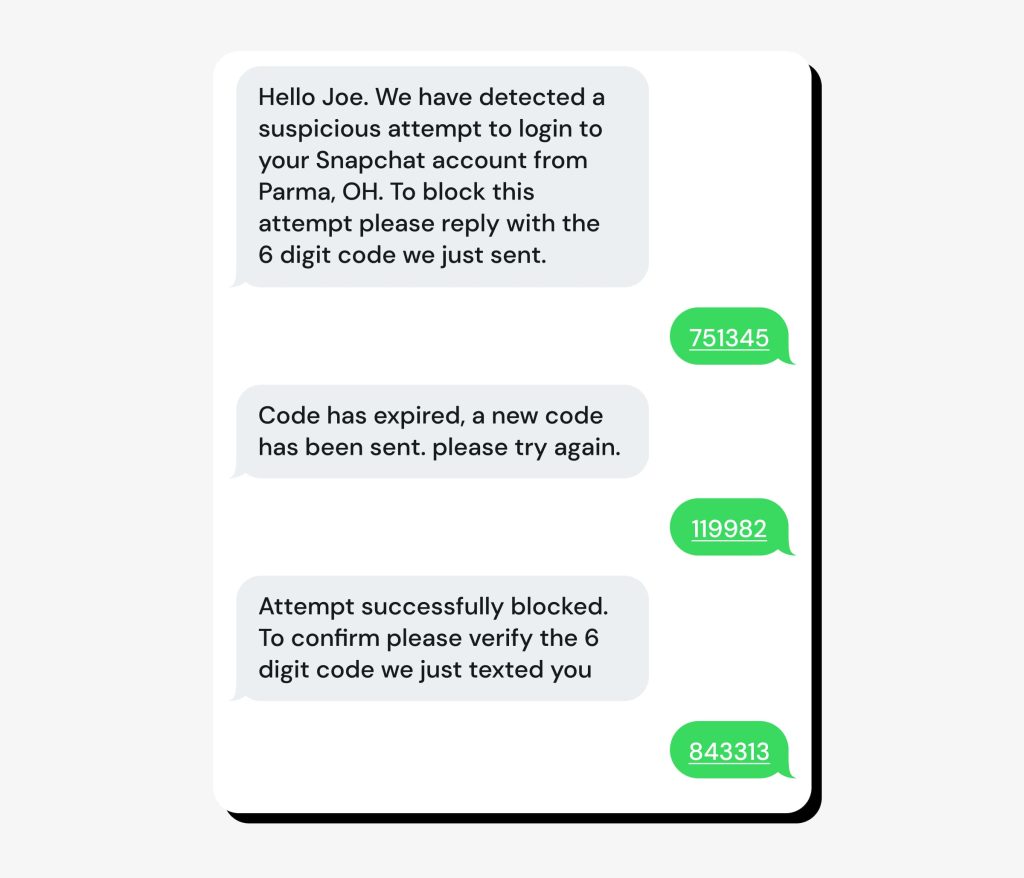
Phishing messages often create a sense of urgency to convince victims to act without thinking. There are many different ways to craft these messages, but here are some examples you should be familiar with:
- Your Snapchat username has been compromised
- Your data is out-of-date and will be deleted if you don’t act now
- You won a contest and must click now to verify your identity
- You now have access to special content or discounted products
- You will receive something valuable if you click now
- Snapchat support has an urgent message for you
- Act now or your friends list will be deleted for inactivity
Are you receiving phishing scam messages? Here’s what to do:
First, never click on embedded links or open downloads you receive through email. If you get a legitimate email from Snapchat, you should be able to see it when you log into your Snapchat account on the mobile app the way you normally do.
If you suspect an incoming message is part of a phishing scam, delete it. Phishing emails can’t harm your device or infiltrate your accounts if you don’t open them. If you’re worried that the message may be genuine, consider asking Snapchat Support to confirm.
4. Snapchat catfish scams
A catfish is someone who creates a fake identity to attract others online. They pretend to be an attractive person and then flirt with other users, hoping to convince them that they’re real. Catfish scams are common on dating sites, but they are also a part of Snapchat meetup scams that target young adults.
In many cases, catfish meetup scams end when the victim asks to meet and the catfish fails to show up. These catfish scams usually involve unsuspecting victims buying a bus or plane ticket for the scammer.
But some scammers use Snapchat catfish scams to trick people into believing in a connection with a fake love interest. They may ask for money, photos, or other sensitive pieces of information and abuse their victims’ trust continuously. If you fall victim to this kind of Snapchat scam, you may continue to send money for years.
This kind of emotional manipulation is what makes catfishing dangerous. Scammers know that many young adults are looking for (or at least open to) forging romantic connections online. They can use that fact to target unsuspecting victims with meetup scams and other Snapchat romance scams.
How to identify a catfish on Snapchat
Romance scams can be very difficult to identify, but many follow similar methods. Be especially cautious if a new connection does any of these things:
- Expresses intense emotion for you very quickly. Most romance scams escalate very quickly. They may profess their love for you within a few days of talking, or find other ways to make you feel like the relationship is special.
- Consistently makes excuses to avoid video calls. Catfishers typically make up excuses to avoid showing their face to the people they’re scamming. Be suspicious whenever someone consistently rejects video calls.
- Tries to isolate you from people who doubt your relationship. Your friends and family might get suspicious about the new person you’re seeing online. If your new partner sees that as a threat and tries to push you away from those people, it’s a sign they may intend to scam you.
What to do if you’re being catfished
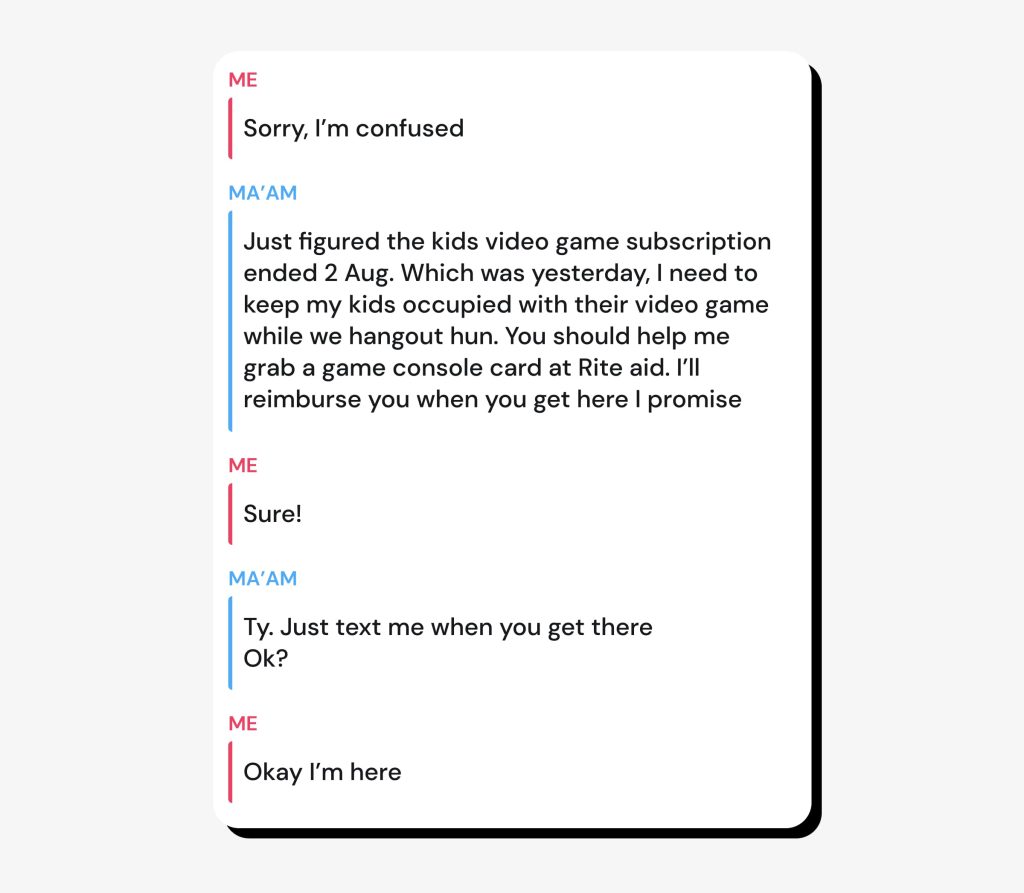
Most people don’t know whether they’re being catfished until it’s too late. If you suspect someone you’re talking to on Snapchat is a catfish, take some time to research them more carefully. Review some of the things they’re asking you, looking for evidence of emotional manipulation.
Since catfish scams generally move very quickly, slowing things down can help. Don’t make promises to meet or get romantically involved with people you don’t know yet, and don’t respond to pressure to make those commitments now. If your connection is a genuine one, they will understand and stop insisting.
5. Fake surveys and forms
Survey scams are particularly common on Snapchat, often under the fictitious name “Snap Surveys Inc”. Confusingly, there is a legitimate survey software company called Snap Surveys, but it has no connection with Snapchat.
This scam comes in several forms. Sometimes it is part of a Mystery Shopping Scam, telling users that they can win cash prizes (usually gift cards) for completing a survey about their experience on the social media platform. Sometimes scammers tell victims they’ve already won the prize and need to fill out the form to receive it.
In either case, the survey form either contains malicious code or asks for sensitive information. Malicious code injection is a well-known technical cyberattack, and survey form fields are an ideal target. There’s also a less technical version where attackers simply ask “security questions” directly.
Once they gain access to your data, hackers will use it to take over your Snapchat account. If they find out your password, they will try to use it on other platforms as well, potentially breaking into your email, bank account, and other sensitive accounts.
How to tell if a survey is fake
Snapchat does occasionally commission surveys of its users. However, it does not promise financial rewards for participating. Any survey or poll that promises you a guaranteed reward is probably a scam.
Many third-party survey companies offer sweepstakes to users who participate in surveys. In this case, you aren’t guaranteed a financial reward, but you do have a chance of winning something. Some of these surveys may be legitimate, but many of them are Snapchat scams.
Be on the lookout for surveys that ask for sensitive data about you. This is the most obvious sign that the survey is fake. Never enter your password or other sensitive information into an online form.
What to do if you’ve entered data into a fake form
If you’ve already input sensitive data into a fake form, you’ll need to quickly change your Snapchat password and tighten security on your other accounts. Think about the questions included on the form. If it requested financial information, you may need to check with your bank. If it asked for email account information, you should change your email password as well.
Make sure you use a strong password that is unique, or start using a password manager to secure your accounts. Consider checking the Dark Web for signs of a data breach involving your login credentials.
6. Financial and crypto scams
Financial scams are widespread on social media, and they are among the most common Snapchat scams around. Fraudsters may take advantage of Snapchat’s young user base by promising huge returns through elaborate financial schemes. These schemes often involve cryptocurrencies like Bitcoin.
One version of this scam involves inviting the victim to use a “secret’ trading app. First, the scammer will request a small amount of money just to show how the app works. The account will show impressive triple-digit returns in a few days, convincing the victim to go all in.
Unfortunately, the cash app is fake. There is no account and no actual trading took place. Once you confirm the one-time payment to the spoofed website, that is money lost. The scammer disappears and you may never get the money back.
In other versions of this scam, fraudsters are more interested in finding out your personal details and bank account data. They can use this to commit identity theft. This can be particularly dangerous for young users who don’t have a credit history yet.
How to spot a financial scam on Snapchat
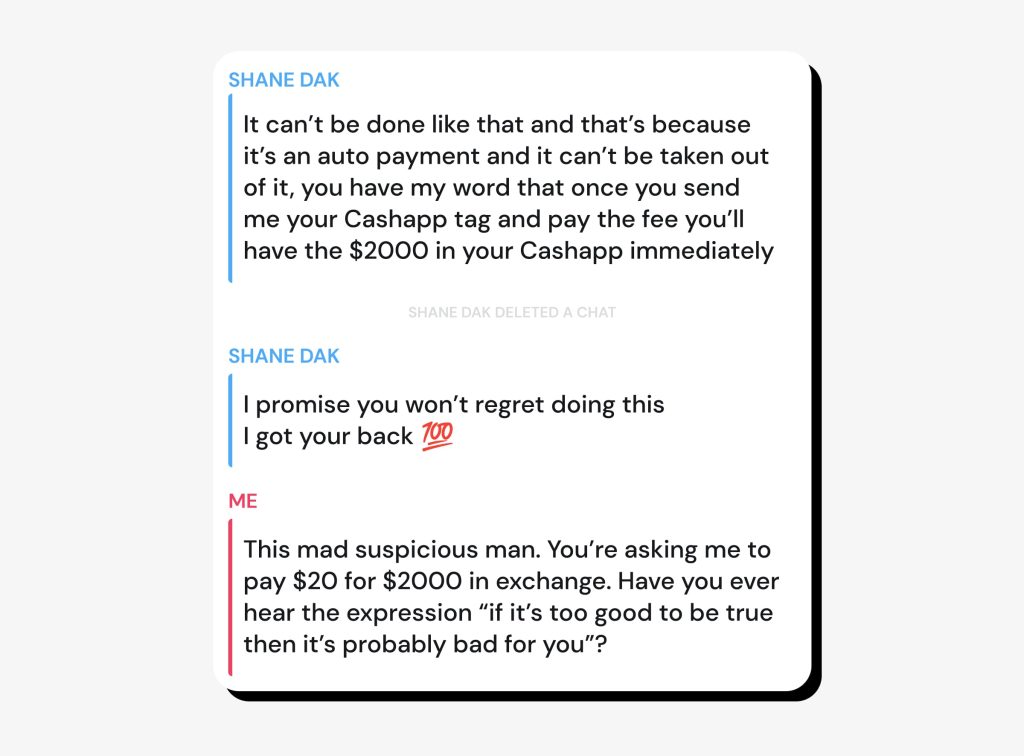
Unsolicited messages from strangers offering money-making opportunities are always scams, period. Some scammers will hack the accounts of trusted contacts to convince others that their financial schemes are trustworthy.
Never trust Snapchat users offering financial advice you didn’t ask for, and make sure to verify any contacts who suddenly start sending you messages about this topic. Try contacting them on another platform or calling their phone number and asking if they really sent you messages on Snapchat – they may not know that their account has been hacked.
What to do if you’ve been scammed
If you sent money to a scammer, you can expect them to try to scam you again. Take time to change your passwords and tighten your Snapchat security settings, and then report the scam. Use Snapchat’s built-in reporting feature to launch an investigation into the user who scammed you.
You should also report the scam to the Federal Trade Commission on its official website ReportFraud.ftc.gov. The FTC can provide you with additional resources and education on how to recover from fraud, and may even help you get your money back.
7. Fraudulent check cashing scams
Snapchat check cashing scams offer a new spin on an old trick. Hackers who gain access to someone’s account may reach out to friends and acquaintances asking for help cashing a check. They’ll often invent a story explaining that they urgently need money but can’t access any without your help.
If you agree, you’ll receive a check in the mail. The scammer will ask you to cash the check and pay them the amount in cash, Bitcoin, or gift cards. Often, they’ll instruct you to keep a percentage for yourself as well.
The problem is that the check is fake, and once it bounces, you will have to pay back the debt. You will also have to pay a bounced check fee to your bank, which is usually between $35-45. It will usually take a few days for the check to bounce, by which time the scammer has long since disappeared with your money.
How to identify a fake check scam on Snapchat
Any time someone asks you to cash a check in their name, you should treat it as a scam. There are very few legitimate reasons why you should cash a check in someone’s name. Even if someone you trust asks you to do this, you should be very suspicious.
When a connection you made online asks you to cash a check in their name, ignore the request and use Snapchat’s built-in reporting feature to report the account. You may also want to block the account to prevent them from making further requests.
What to do if you cashed a fake check
First, talk to your bank and try to end the transaction as quickly as possible. If you still have the money available, this will be easy to do. If you’ve already given away the money, you’ll have to ask the bank to help on your behalf.
You should also file a report with the FTC using ReportFraud.ftc.gov. If you received the check in the mail, you can also report the fraud to the US Postal Inspection Service. They may be able to help you recover some of your money, but it’s not guaranteed.
8. Snapchat premium scams
Premium Snapchat is not a separate app. It’s an unofficial way of using the platform to charge for content. This goes against Snapchat’s Community Guidelines and Commercial Content rules, so it’s almost always a scam.
The most common way fraudsters use this invented feature is by promising access to “exclusive” content from attractive women in exchange for money. The Snapchat account typically shows women in suggestive poses and offers more explicit content to users who pay. Since there is no such thing as a premium Snapchat account, payment must be made outside the platform – often using Venmo or a similar service.
In many cases, the accounts are entirely fake and users never gain access to any additional content at all. In other cases, the premium Snapchat account uses content stolen from dating sites or paid content platforms like OnlyFans.
The important thing is that since Snapchat doesn’t support this feature, content creators have no obligation to actually provide anything to subscribers. This sneaky approach lets fraudsters bypass important verifications that make sure they aren’t showing explicit imagery to minors.
All paid Snapchat content is a scam
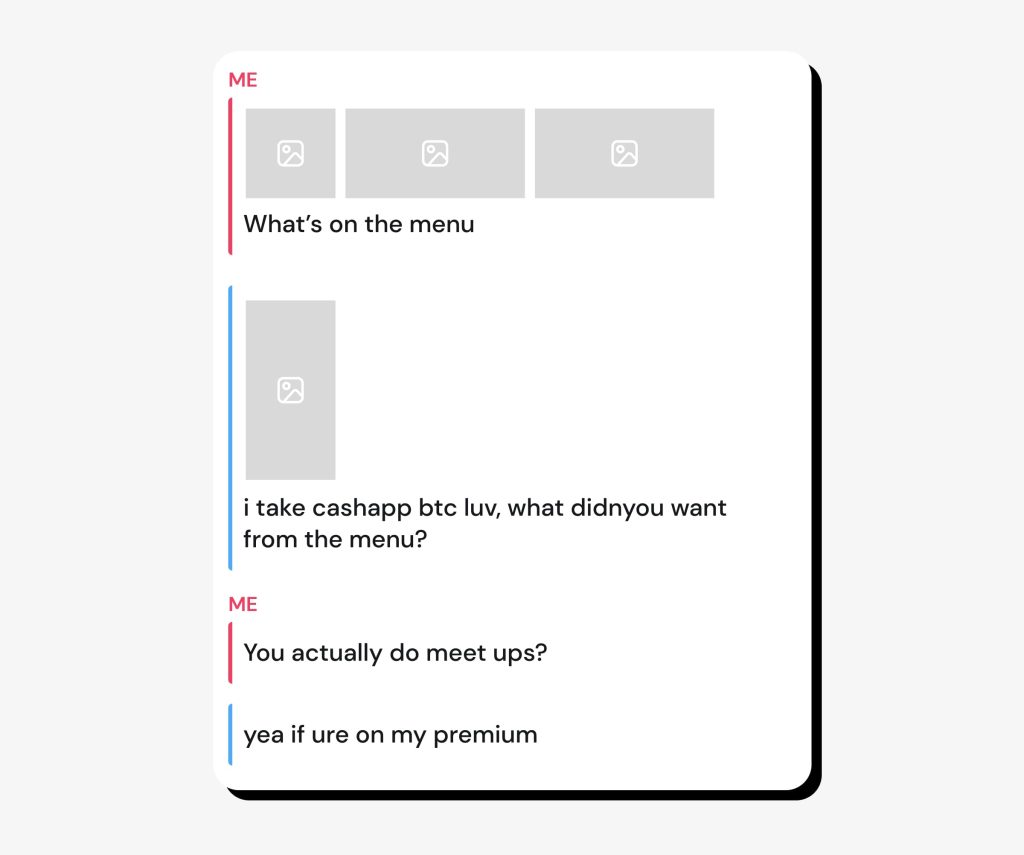
Snapchat has a very clear position on subscription content – it’s not allowed. If Snapchat wanted to allow content creators to make money directly from users, it would launch an official feature for that purpose.
Many social media platforms allow content creators to charge for their work, and some provide access to explicit content as well. These platforms have to verify new users and keep minors away from adult content in ways that Snapchat can’t. Any time Snapchat users ask for money for photos and videos, they’re running Snapchat premium scams.
What if you’ve already paid for a subscription?
In most cases, you can simply stop paying for the subscription and talk with your bank or credit card carrier to reverse the charges. Be aware that your payment provider may not agree to reverse the charges already paid for Snapchat money scams.
You may also receive additional solicitations demanding money for content associated with premium scams. Scammers will often retarget victims who have paid for content in the past, knowing that they’re more likely to pay for new content in the future. You should use Snapchat’s in-app reporting feature to report these accounts whenever they contact you.
9. Sextortion scams
Sextortion scams are similar to romance scams, but with a blackmail twist. These Snapchat scams involve the threat of exposing a victim’s private information – including explicit images – to friends and family on social media. The only way to stop them is by sending money. But that one-time payment can quickly turn into an ongoing bank account scam.
Unfortunately, minors are especially vulnerable to these Snapchat scammers. Some evidence suggests that there is a significant gap between the number of sextortion scams on Snapchat and the number that is actually reported. This kind of abuse is particularly traumatic for teenagers who don’t know where to turn for help and are embarrassed to admit they shared explicit images with a stranger.
Scammers often target young men with these kinds of Snapchat scams. While scammers may also solicit explicit photos from women, their success rate is lower because many women are taught to distrust strangers on the Internet from a young age. Young men may have a false sense of security that a fake love interest can easily exploit.
Once a scammer successfully earns money from blackmailing someone, they continue demanding more and more money over time. The scam doesn’t stop until the victim runs out of money or simply decides to stop participating. At that point, scammers may really send the photos to potential victims’ friends list, post them publicly on social media, or sell them on the Dark Web.
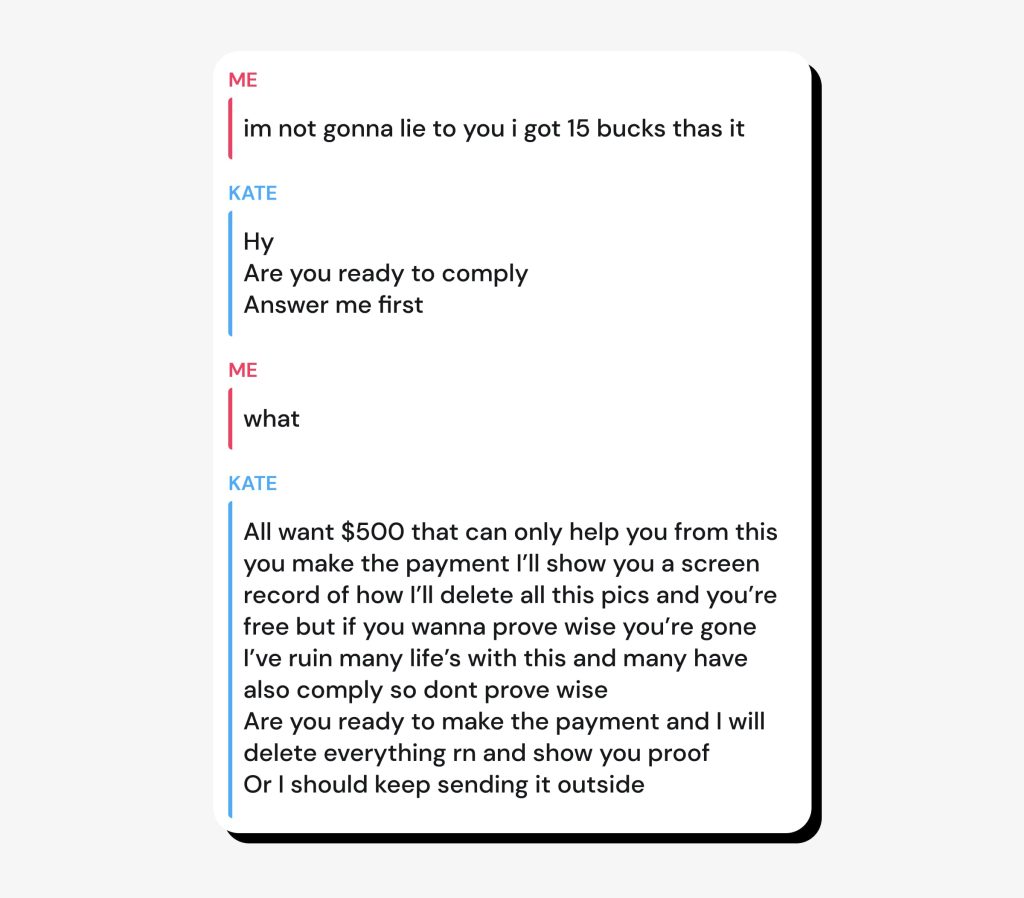
How to tell if you or someone you know is a victim
Sending explicit photos over the Internet is always a bad idea. Even if you trust the person who requested them, you can’t be sure that their accounts and devices are secure. If someone asks for this kind of content early in your relationship, treat it as a warning sign.
For parents and caregivers, it can be very difficult to know when a child is victimized by a sextortion scam. If you suspect a minor is being exploited, try to establish a safe space to talk about online safety and encourage the minor to reach out if they feel they are in trouble.
Talking to kids about sextortion is not easy. Don’t pressure them to tell you about it if they’re not ready, but encourage them to talk to a trusted adult, or to reach out to professional counselors who work with the FBI to catch sextortionists.
10. Influencer impersonation scams
Scammers may impersonate popular influencers to try and build trust with victims and convince them to share confidential information with them. These Snapchat scammers abuse the sense of trust that people have in celebrities, allowing them to make demands that people would never agree to from a stranger in any other situation.
These fraudsters may abuse that trust to carry out any number of scams. They may try to run romance scams, convincing users that they’ve attracted the interest of a famous person. They might try promoting financial services or crypto trading solutions. They may even try to charge users for premium content.
In each case, victims either give up money or personal information to someone disguised as a popular, trustworthy community leader. Once scammers get what they want, they simply disappear.
Even Snapchat itself fell victim to this scam when someone impersonated its CEO and demanded payroll data from a junior employee.
How to tell if you’re talking to a fake influencer
If an influencer account has a low Snap score, it’s a warning sign that this may be a fake account. Some scammers will try to justify their low score by saying it’s a private account that they only use for personal connections.
This is almost never the case. Snapchat lets users create dual accounts for personal and professional use. An influencer who creates a separate, personal account will still be connected to their main account. Making a brand-new personal account with no connection to their other account would be difficult and confusing, so it’s unlikely to happen.
What to do if an influencer asks you for personal data
No serious, professional influencer or community leader has a legitimate reason to ask you for sensitive information. Anyone who asks you for confidential data about your account is a scammer – even if they claim to work for Snapchat. You can safely ignore any messages coming from authority figures on social media.
How to safeguard your Snapchat account
- Use Snapchat’s In-App Reporting feature to flag suspicious accounts. Snapchat allows users to report abuse and fraud directly within the app. Use this feature to tell Snapchat support when users are harassing, abusing, or blackmailing people on the platform.
- Block suspicious contacts and people you don’t trust. Don’t automatically accept incoming connections from people you don’t know.
- Verify links and QR codes before opening them on Snapchat. If you receive a link or a QR code from a connection on Snapchat, reach out to them on a separate platform to ask if they really sent it. They might have had their account hacked and not know it.
- Never share your login information or other sensitive information. Nobody, including Snapchat employees, should ask you for your confidential login data. Use a strong password and never share it with anyone.
- Set up two-factor authentication using a secure 2FA app. Snapchat supports dual-factor authentication, which protects your account from being hacked if someone learns your password. Use an authentication app like Google Authenticator instead of SMS, which is less secure.
- Adjust your in-app privacy settings. Make sure you aren’t publicly sharing location data or other information with people who aren’t trusted contacts. Snapchat is designed for you to cultivate close friendships with people you know – not strangers.
- Take care of your digital footprint. The more scammers find out about you, the easier it is for them to target or impersonate you. Don’t overshare your personal information, even such common details as a phone number, home address, and relatives. Adjust your privacy settings on social media platforms and remove your information from data brokers.
Protect yourself (and your family) from Snapchat scammers
Snapchat’s popularity makes it a major target for scammers and cybercriminals, but the platform is also a constructive place to build and cultivate relationships with people you know. Pay close attention to the way you and your loved ones use social media so you can avoid Snapchat scams and protect yourself from data breach risks.
How does Onerep help?
Onerep helps you keep your personal information private by removing it from data broker and people-search sites.
To target you successfully, scammers use different online sources to find as many personal details about you as they can and piece your persona together to commit identity theft and crimes in your name. One of the major sources of personal information for scammers is data broker and people-search sites.
Overall, there are more than 400 different data points on people available in their databases. They make a profit by combining these details into comprehensive profiles and offering them to anyone for a small fee. Besides full names, dates of birth, phone numbers and address history, data brokers store unsealed lawsuits and legal actions, voter registrations, government spending reports, information about relatives, and more. They also add data pulled from social media accounts and commercial sources like marketing lists, web services and apps that collect data on purchases and other consumer behaviors and habits.
Having your personal details at hand, scammers can easily impersonate you after overtaking your account and convince other users you are the one communicating with them. Furthermore, they may use your private data to make you feel sympathetic by mentioning a similar personal experience or pretending you have much in common, and, subsequently, earn your trust. These tactics are common for catfish and sugar relationship scams. Even knowing your job title and workplace can be beneficial to scammers – they can assess whether you are worth targeting for financial scams and how much money they can defraud you of. Other common details such as your address and relatives can be used for blackmail and threats.
The list goes on and on, but one thing stays the same – all that fraudsters need is a couple of personal details about you.
Onerep helps you protect your personal information by removing it from data brokers and people-search websites. We scan 232 sites to find your profiles and send opt-out requests on your behalf. After verifying that your profile has been removed, we continually monitor the web in case any new privacy-breaching sites pop up. If they do, we repeat the process all over to make sure your personal information stays off data brokers for good.
FAQ
How can you identify a fake Snapchat account?
Fake accounts typically have professional-quality pictures showing a luxurious lifestyle, but very few connections and a low Snap score. Be especially cautious of accounts that claim to be connected with well-known brands or celebrities.
Why are there so many fake Snapchat accounts?
Hackers can use bots to automatically create fake Snapchat accounts and add people to the platform. Most of these accounts spread false information and political messages to users, but some are designed for more dangerous purposes – like spreading malware or running crypto scams.
Is Snapchat safe for young people to use?
Snapchat is no more dangerous than any other social media platform. The majority of users are genuine, but there are also scammers and cybercriminals looking to exploit underage victims. Parents and legal guardians should monitor their children’s use of Snapchat and openly discuss the dangers of connecting with strangers online.
Can hackers get your phone number from Snapchat?
Snapchat does not share users’ phone numbers publicly. The company does store users' phone numbers in its own database, and it is possible for hackers to steal that information directly from Snapchat. If this happens, Snapchat must notify you that your information has been breached.
What are Snapchat 2FA text messages with code scams?
Dual-factor authentication keeps your account secure by requiring you to verify yourself twice before logging in. However, Snapchat scammers can also use this feature to trick you into clicking on phishing scams using fake websites to capture your login information. Ignore all 2FA text messages that you don't recognize from your own logins.
What is a ghost account on Snapchat?
Ghost mode allows Snapchat users to avoid sharing location data with contacts. This can protect you from some of the most common Snapchat scams and make it harder for hackers to target you. Your location data is personally identifiable information, and should be kept private.
 Erin Kapczynski
SVP, B2B Marketing at Onerep
Erin Kapczynski
SVP, B2B Marketing at Onerep

